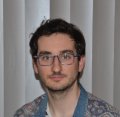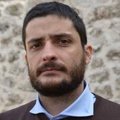Join the Special Session on Neuromechanical Modelling and Control for Wearable Robots: Enhancing Movement after Neuromuscular Injuries.
The International Symposium on Wearable Robotics (WeRob 2020) and WearRAcon Europe
October 13-16, 2020 (Virtual).
Web: http://www.2020.werob.org/
Abstract:
Human-machine interfaces (HMIs) are central for establishing a natural interplay between humans and wearable robots such as exoskeleton and bionic limbs. The need for robust and intuitive HMI has becoming increasingly central with the development of new classes of exoskeletons that are soft or flexible. Current HMIs suffer from limitations hindering wearables robots’ translation to the real world. State of the art HMIs are based on model-free (e.g. regression) algorithms that cannot robustly generalize beyond training conditions. Moreover, model-free techniques regard the human as a black box, thereby hiding the mechanisms underlying human movement and machine interaction. An alternative approach is that of building mechanistic models of the human body. Human modelling offers the unique opportunity to open a window inside the neuromusculoskeletal system of the user. Theses information can then be use by wearables robot to assist the user.
In this special session, we first present the challenge that soft exosuit present for HMIs. We will also present the state of the art in neuromechanics based control of wearables robot as well as how neuromechanics can help us to create better HMI for rehabilitation and finally its possible impact in healthcare.
Speakers:
- Guillaume Durandau, University of Twente, The Netherlands.  Guillaume Durandau is a postdoctoral researcher at the Department of Biomechanical Engineering, University of Twente, Enschede, the Netherlands. He obtained his engineering diploma at ISEN, Toulon, France and his master degrees at the University of Sherbrooke, Sherbrooke, Canada. During his master, he spend four months at the CINESTAV, Mexico. He also obtained during his master, the Mitacs Globalink Research Award. At the beginning of 2015, he started as a research assistant at the Institute of Neurorehabilitation Systems, UMG, Gottingen, Germany. In 2017, he started is PhD at the University of Twente, Enschede, the Netherlands. During his PhD, He won the Best Demo Award in 2018 at the 7th IEEE International Conference on Biomedical Robotics and Biomechatronic and Best paper Published by IEEE-EMBS in 2017-18, 3rd place at the 7th Dutch Bio-medical Engineering Conference.
Guillaume Durandau is a postdoctoral researcher at the Department of Biomechanical Engineering, University of Twente, Enschede, the Netherlands. He obtained his engineering diploma at ISEN, Toulon, France and his master degrees at the University of Sherbrooke, Sherbrooke, Canada. During his master, he spend four months at the CINESTAV, Mexico. He also obtained during his master, the Mitacs Globalink Research Award. At the beginning of 2015, he started as a research assistant at the Institute of Neurorehabilitation Systems, UMG, Gottingen, Germany. In 2017, he started is PhD at the University of Twente, Enschede, the Netherlands. During his PhD, He won the Best Demo Award in 2018 at the 7th IEEE International Conference on Biomedical Robotics and Biomechatronic and Best paper Published by IEEE-EMBS in 2017-18, 3rd place at the 7th Dutch Bio-medical Engineering Conference.
Email: g.v.durandau@utwente.nl
Personal pages: https://people.utwente.nl/g.v.durandau
- Michele Xiloyannis, ETH Zurich, Switzerland  Michele Xiloyannis graduated with a Bachelor degree in Biomedical Engineering from the University of Pisa, Italy, in 2013 and obtained a Master of Science in Neurotechnology from Imperial College London, in 2014. In early 2015, he received the Singapore International Graduate Award (SINGA) Scholarship to join the Robotics Research Center at Nanyang Technological University. There he focused his research on the design and control of soft wearable robots for assisting people with mobility impairments. During the course of his doctoral studies, Michele spent 6 months in the Biomechanical Engineering Lab at the University of Twente, Netherlands, where he worked on intuitive ways of controlling wearable robots using surface electromyography. He is now a PostDoc in the SMS Lab, working on the development and validation of soft, lightweight wearable robots to support people with mobility disorders in their daily lives.
Michele Xiloyannis graduated with a Bachelor degree in Biomedical Engineering from the University of Pisa, Italy, in 2013 and obtained a Master of Science in Neurotechnology from Imperial College London, in 2014. In early 2015, he received the Singapore International Graduate Award (SINGA) Scholarship to join the Robotics Research Center at Nanyang Technological University. There he focused his research on the design and control of soft wearable robots for assisting people with mobility impairments. During the course of his doctoral studies, Michele spent 6 months in the Biomechanical Engineering Lab at the University of Twente, Netherlands, where he worked on intuitive ways of controlling wearable robots using surface electromyography. He is now a PostDoc in the SMS Lab, working on the development and validation of soft, lightweight wearable robots to support people with mobility disorders in their daily lives.
Email: michele.xiloyannis@hest.ethz.ch
Personal pages:
https://sms.hest.ethz.ch/the-group/team/michele-xiloyannis.html
https://www.michelexiloyannis.com/
- Giacomo Severini, UCD, Ireland  Giacomo Severini is currently a Lecturer in Biomedical Engineering at the School of Electrical and Electronic Engineering. His research is focused on the study of human motor control and motor learning as a mean for developing novel concepts and tools for improving rehabilitation of impaired individuals. He is particularly interested in the development and use of robots in various aspects of the rehabilitation process. Dr. Severini received his MS and PhD degrees in Electrical Engineering and Biomedical Engineering from Roma Tre University in Rome, Italy, in 2008 and 2012, respectively. He worked as Research Associate at the Motion Analysis Laboratory of the Spaulding Rehabilitation Hospital in Boston from 2011 to 2015 and as postdoctoral researcher at Harvard Medical School from 2012 to 2015.
Giacomo Severini is currently a Lecturer in Biomedical Engineering at the School of Electrical and Electronic Engineering. His research is focused on the study of human motor control and motor learning as a mean for developing novel concepts and tools for improving rehabilitation of impaired individuals. He is particularly interested in the development and use of robots in various aspects of the rehabilitation process. Dr. Severini received his MS and PhD degrees in Electrical Engineering and Biomedical Engineering from Roma Tre University in Rome, Italy, in 2008 and 2012, respectively. He worked as Research Associate at the Motion Analysis Laboratory of the Spaulding Rehabilitation Hospital in Boston from 2011 to 2015 and as postdoctoral researcher at Harvard Medical School from 2012 to 2015.
Email: giacomo.severini@ucd.ie
Personal pages: https://people.ucd.ie/giacomo.severini
- Jose Gonzalez-Vargas , OttoBock Healthcare, Germany  Jose Gonzalez-Vargas is currently an Innovation and Research Manager of Global Research at Ottobock SE & KGaA. Within this role he is in charge of finding and translating novel ideas into successful products. He is overseeing several projects in the field of lower limb Prosthetics and Exoskeletons for the healthcare and manufacturing domains. He is also the coordinator of the EU project SimBionics and PI for several other EU and German funded projects. He obtained a degree in Electronic Engineering Technology Institute of Costa Rica, focused on embedded systems and automatic control. He obtained the master degree in Artificial System Engineering (2009) and a PhD in Medical System Engineering (2012) in the laboratory of Bio-robotics Assistive Devices from Chiba University, Japan. In 2006 he was granted Japan’s MEXT scholarship and in 2010 he was granted the JSPS young research fellowship. In 2013 he was a postdoc fellow researcher in the Research Center for Frontier Medical Engineering in Chiba University, as well as a visiting researcher in the Neuro-rehabilitation department of the Medical University of Göttingen chaired at that time by Prof. Dario Farina. From 2013 – 2017, he worked as a Research Fellow in the Neural Rehabilitation group of the Cajal institute in the Spanish National Research Council in Spain, where he was involved in numerous funded research projects.
Jose Gonzalez-Vargas is currently an Innovation and Research Manager of Global Research at Ottobock SE & KGaA. Within this role he is in charge of finding and translating novel ideas into successful products. He is overseeing several projects in the field of lower limb Prosthetics and Exoskeletons for the healthcare and manufacturing domains. He is also the coordinator of the EU project SimBionics and PI for several other EU and German funded projects. He obtained a degree in Electronic Engineering Technology Institute of Costa Rica, focused on embedded systems and automatic control. He obtained the master degree in Artificial System Engineering (2009) and a PhD in Medical System Engineering (2012) in the laboratory of Bio-robotics Assistive Devices from Chiba University, Japan. In 2006 he was granted Japan’s MEXT scholarship and in 2010 he was granted the JSPS young research fellowship. In 2013 he was a postdoc fellow researcher in the Research Center for Frontier Medical Engineering in Chiba University, as well as a visiting researcher in the Neuro-rehabilitation department of the Medical University of Göttingen chaired at that time by Prof. Dario Farina. From 2013 – 2017, he worked as a Research Fellow in the Neural Rehabilitation group of the Cajal institute in the Spanish National Research Council in Spain, where he was involved in numerous funded research projects.
- Nevio Luigi Tagliamonte, University Campus Bio-Medico di Roma, Italy  Nevio Luigi Tagliamonte is Assistant Professor of Bioengineering at Università Campus Bio-Medico di Roma, where he is member of the Research Unit of Advanced Robotics and Human-Centered Technologies. He is also part of the Laboratory of Robotic Neurorehabilitation of Fondazione Santa Lucia in Rome. He has expertise in the fields of wearable robotics, biomechatronics, robots control and physical human-robot interaction, compliant actuators, biomechanics and robot-aided neurorehabilitation. His research activity is focused on the design, development and validation of biomedical robots, with specific attention to exoskeletons. He worked on many European research projects on lower limb exoskeletons and on exoskeleton-aided walking for rehabilitation and assistance purposes.
Nevio Luigi Tagliamonte is Assistant Professor of Bioengineering at Università Campus Bio-Medico di Roma, where he is member of the Research Unit of Advanced Robotics and Human-Centered Technologies. He is also part of the Laboratory of Robotic Neurorehabilitation of Fondazione Santa Lucia in Rome. He has expertise in the fields of wearable robotics, biomechatronics, robots control and physical human-robot interaction, compliant actuators, biomechanics and robot-aided neurorehabilitation. His research activity is focused on the design, development and validation of biomedical robots, with specific attention to exoskeletons. He worked on many European research projects on lower limb exoskeletons and on exoskeleton-aided walking for rehabilitation and assistance purposes.
Email: n.tagliamonte@unicampus.it
- Daniel Häufle, University of Tubingen, Germany  Daniel Häufle is head of the Research Group Multi-Level Modeling in Motor Control and Rehabilitation Robotics at the Hertie Institute for Clinical Brain Research, University of Tübingen, Germany. His group investigates how muscles and the nervous system interact to generate human movement and how this interaction may be impaired in neurological movement disorders. The models developed serve as tools to study the interaction with external forces and assistive devices. He studied physics and biomechanics in Jena and Calgary. For his PhD, he worked in the Biomechanics & Biorobotics Lab of Syn Schmitt at the University of Stuttgart. With a Fulbright Scholarship he visited the Robotics Institute of Carnegie Mellon University in Pittsburgh, USA. As a post-doc, he was a member of the Simulation Technology research cluster in Stuttgart.
Daniel Häufle is head of the Research Group Multi-Level Modeling in Motor Control and Rehabilitation Robotics at the Hertie Institute for Clinical Brain Research, University of Tübingen, Germany. His group investigates how muscles and the nervous system interact to generate human movement and how this interaction may be impaired in neurological movement disorders. The models developed serve as tools to study the interaction with external forces and assistive devices. He studied physics and biomechanics in Jena and Calgary. For his PhD, he worked in the Biomechanics & Biorobotics Lab of Syn Schmitt at the University of Stuttgart. With a Fulbright Scholarship he visited the Robotics Institute of Carnegie Mellon University in Pittsburgh, USA. As a post-doc, he was a member of the Simulation Technology research cluster in Stuttgart.
Personal pages: https://www.hih-tuebingen.de/mocom/
Call for Contributions:
This Special Session is currently open to poster contributions. All contributors (i.e. poster and oral) must submit a 2-page abstract manuscript. All manuscripts will be peer-reviewed. Accepted contributions will appear in the Conference Proceedings, which will be published as a book by Springer. Selected papers will be invited to Special Issues in Referred Journals.
Further information at: http://www.2020.werob.org/submission/
Important Dates:
- Manuscript submission deadline: July, 31, 2020.
- Notification of manuscript acceptance: August, 31, 2020.
- Authors Registration Deadline: September, 15, 2020.
- Final Version Submission: September, 15, 2020.
- Early Registration: September, 15, 2020.
- Symposium: September, 15, 2020.
Workshop Organizers:
- Massimo Sartori (University of Twente, The Netherlands).
- Guillaume Durandau (University of Twente, The Netherlands).

 Guillaume Durandau is a postdoctoral researcher at the Department of Biomechanical Engineering, University of Twente, Enschede, the Netherlands. He obtained his engineering diploma at ISEN, Toulon, France and his master degrees at the University of Sherbrooke, Sherbrooke, Canada. During his master, he spend four months at the CINESTAV, Mexico. He also obtained during his master, the Mitacs Globalink Research Award. At the beginning of 2015, he started as a research assistant at the Institute of Neurorehabilitation Systems, UMG, Gottingen, Germany. In 2017, he started is PhD at the University of Twente, Enschede, the Netherlands. During his PhD, He won the Best Demo Award in 2018 at the 7th IEEE International Conference on Biomedical Robotics and Biomechatronic and Best paper Published by IEEE-EMBS in 2017-18, 3rd place at the 7th Dutch Bio-medical Engineering Conference.
Guillaume Durandau is a postdoctoral researcher at the Department of Biomechanical Engineering, University of Twente, Enschede, the Netherlands. He obtained his engineering diploma at ISEN, Toulon, France and his master degrees at the University of Sherbrooke, Sherbrooke, Canada. During his master, he spend four months at the CINESTAV, Mexico. He also obtained during his master, the Mitacs Globalink Research Award. At the beginning of 2015, he started as a research assistant at the Institute of Neurorehabilitation Systems, UMG, Gottingen, Germany. In 2017, he started is PhD at the University of Twente, Enschede, the Netherlands. During his PhD, He won the Best Demo Award in 2018 at the 7th IEEE International Conference on Biomedical Robotics and Biomechatronic and Best paper Published by IEEE-EMBS in 2017-18, 3rd place at the 7th Dutch Bio-medical Engineering Conference.  Michele Xiloyannis graduated with a Bachelor degree in Biomedical Engineering from the University of Pisa, Italy, in 2013 and obtained a Master of Science in Neurotechnology from Imperial College London, in 2014. In early 2015, he received the Singapore International Graduate Award (SINGA) Scholarship to join the Robotics Research Center at Nanyang Technological University. There he focused his research on the design and control of soft wearable robots for assisting people with mobility impairments. During the course of his doctoral studies, Michele spent 6 months in the Biomechanical Engineering Lab at the University of Twente, Netherlands, where he worked on intuitive ways of controlling wearable robots using surface electromyography. He is now a PostDoc in the SMS Lab, working on the development and validation of soft, lightweight wearable robots to support people with mobility disorders in their daily lives.
Michele Xiloyannis graduated with a Bachelor degree in Biomedical Engineering from the University of Pisa, Italy, in 2013 and obtained a Master of Science in Neurotechnology from Imperial College London, in 2014. In early 2015, he received the Singapore International Graduate Award (SINGA) Scholarship to join the Robotics Research Center at Nanyang Technological University. There he focused his research on the design and control of soft wearable robots for assisting people with mobility impairments. During the course of his doctoral studies, Michele spent 6 months in the Biomechanical Engineering Lab at the University of Twente, Netherlands, where he worked on intuitive ways of controlling wearable robots using surface electromyography. He is now a PostDoc in the SMS Lab, working on the development and validation of soft, lightweight wearable robots to support people with mobility disorders in their daily lives. Giacomo Severini is currently a Lecturer in Biomedical Engineering at the School of Electrical and Electronic Engineering. His research is focused on the study of human motor control and motor learning as a mean for developing novel concepts and tools for improving rehabilitation of impaired individuals. He is particularly interested in the development and use of robots in various aspects of the rehabilitation process. Dr. Severini received his MS and PhD degrees in Electrical Engineering and Biomedical Engineering from Roma Tre University in Rome, Italy, in 2008 and 2012, respectively. He worked as Research Associate at the Motion Analysis Laboratory of the Spaulding Rehabilitation Hospital in Boston from 2011 to 2015 and as postdoctoral researcher at Harvard Medical School from 2012 to 2015.
Giacomo Severini is currently a Lecturer in Biomedical Engineering at the School of Electrical and Electronic Engineering. His research is focused on the study of human motor control and motor learning as a mean for developing novel concepts and tools for improving rehabilitation of impaired individuals. He is particularly interested in the development and use of robots in various aspects of the rehabilitation process. Dr. Severini received his MS and PhD degrees in Electrical Engineering and Biomedical Engineering from Roma Tre University in Rome, Italy, in 2008 and 2012, respectively. He worked as Research Associate at the Motion Analysis Laboratory of the Spaulding Rehabilitation Hospital in Boston from 2011 to 2015 and as postdoctoral researcher at Harvard Medical School from 2012 to 2015.  Jose Gonzalez-Vargas is currently an Innovation and Research Manager of Global Research at Ottobock SE & KGaA. Within this role he is in charge of finding and translating novel ideas into successful products. He is overseeing several projects in the field of lower limb Prosthetics and Exoskeletons for the healthcare and manufacturing domains. He is also the coordinator of the EU project SimBionics and PI for several other EU and German funded projects. He obtained a degree in Electronic Engineering Technology Institute of Costa Rica, focused on embedded systems and automatic control. He obtained the master degree in Artificial System Engineering (2009) and a PhD in Medical System Engineering (2012) in the laboratory of Bio-robotics Assistive Devices from Chiba University, Japan. In 2006 he was granted Japan’s MEXT scholarship and in 2010 he was granted the JSPS young research fellowship. In 2013 he was a postdoc fellow researcher in the Research Center for Frontier Medical Engineering in Chiba University, as well as a visiting researcher in the Neuro-rehabilitation department of the Medical University of Göttingen chaired at that time by Prof. Dario Farina. From 2013 – 2017, he worked as a Research Fellow in the Neural Rehabilitation group of the Cajal institute in the Spanish National Research Council in Spain, where he was involved in numerous funded research projects.
Jose Gonzalez-Vargas is currently an Innovation and Research Manager of Global Research at Ottobock SE & KGaA. Within this role he is in charge of finding and translating novel ideas into successful products. He is overseeing several projects in the field of lower limb Prosthetics and Exoskeletons for the healthcare and manufacturing domains. He is also the coordinator of the EU project SimBionics and PI for several other EU and German funded projects. He obtained a degree in Electronic Engineering Technology Institute of Costa Rica, focused on embedded systems and automatic control. He obtained the master degree in Artificial System Engineering (2009) and a PhD in Medical System Engineering (2012) in the laboratory of Bio-robotics Assistive Devices from Chiba University, Japan. In 2006 he was granted Japan’s MEXT scholarship and in 2010 he was granted the JSPS young research fellowship. In 2013 he was a postdoc fellow researcher in the Research Center for Frontier Medical Engineering in Chiba University, as well as a visiting researcher in the Neuro-rehabilitation department of the Medical University of Göttingen chaired at that time by Prof. Dario Farina. From 2013 – 2017, he worked as a Research Fellow in the Neural Rehabilitation group of the Cajal institute in the Spanish National Research Council in Spain, where he was involved in numerous funded research projects.  Nevio Luigi Tagliamonte is Assistant Professor of Bioengineering at Università Campus Bio-Medico di Roma, where he is member of the Research Unit of Advanced Robotics and Human-Centered Technologies. He is also part of the Laboratory of Robotic Neurorehabilitation of Fondazione Santa Lucia in Rome. He has expertise in the fields of wearable robotics, biomechatronics, robots control and physical human-robot interaction, compliant actuators, biomechanics and robot-aided neurorehabilitation. His research activity is focused on the design, development and validation of biomedical robots, with specific attention to exoskeletons. He worked on many European research projects on lower limb exoskeletons and on exoskeleton-aided walking for rehabilitation and assistance purposes.
Nevio Luigi Tagliamonte is Assistant Professor of Bioengineering at Università Campus Bio-Medico di Roma, where he is member of the Research Unit of Advanced Robotics and Human-Centered Technologies. He is also part of the Laboratory of Robotic Neurorehabilitation of Fondazione Santa Lucia in Rome. He has expertise in the fields of wearable robotics, biomechatronics, robots control and physical human-robot interaction, compliant actuators, biomechanics and robot-aided neurorehabilitation. His research activity is focused on the design, development and validation of biomedical robots, with specific attention to exoskeletons. He worked on many European research projects on lower limb exoskeletons and on exoskeleton-aided walking for rehabilitation and assistance purposes. Daniel Häufle is head of the Research Group Multi-Level Modeling in Motor Control and Rehabilitation Robotics at the Hertie Institute for Clinical Brain Research, University of Tübingen, Germany. His group investigates how muscles and the nervous system interact to generate human movement and how this interaction may be impaired in neurological movement disorders. The models developed serve as tools to study the interaction with external forces and assistive devices. He studied physics and biomechanics in Jena and Calgary. For his PhD, he worked in the Biomechanics & Biorobotics Lab of Syn Schmitt at the University of Stuttgart. With a Fulbright Scholarship he visited the Robotics Institute of Carnegie Mellon University in Pittsburgh, USA. As a post-doc, he was a member of the Simulation Technology research cluster in Stuttgart.
Daniel Häufle is head of the Research Group Multi-Level Modeling in Motor Control and Rehabilitation Robotics at the Hertie Institute for Clinical Brain Research, University of Tübingen, Germany. His group investigates how muscles and the nervous system interact to generate human movement and how this interaction may be impaired in neurological movement disorders. The models developed serve as tools to study the interaction with external forces and assistive devices. He studied physics and biomechanics in Jena and Calgary. For his PhD, he worked in the Biomechanics & Biorobotics Lab of Syn Schmitt at the University of Stuttgart. With a Fulbright Scholarship he visited the Robotics Institute of Carnegie Mellon University in Pittsburgh, USA. As a post-doc, he was a member of the Simulation Technology research cluster in Stuttgart.